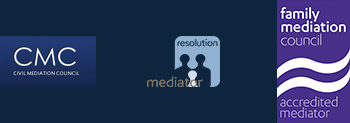When people become involved in a dispute there are a number of options for resolution from which they can choose. They can litigate their dispute, or they can elect to use a method of Alternative Dispute Resolution, including mediation.
Litigation
The advantage of litigation is that the winning party will generally receive everything that they sought. That’s about the only advantage, but the disadvantages are many.
Compared to mediation or any other form of Alternative Dispute Resolution, Litigation is a very time consuming and protracted process, and the more complicated the issue, the more protracted it will become. The pre-trial process can drag on for months or years. It begins with a party seeking legal advice, which is followed some time later preparation and dispatch of a letter before action. The discovery process follows, and a significant amount of time will then be required to digest all the information that the discovery process may reveal. There is then the negotiation phase where solicitors may exchange offer an counter-offer for some time. Many cases settle at some point in this process, but for those that do not, the matter will eventually come to trial.
Given the current backlog in the legal system, it may be quite some time before that happens. Figures released by the Ministry of Justice reveal that, in England and Wales, the time between the case being submitted to the court and the end of the trial is currently around 59 weeks – or nearly 15 months. All of this costs money. While the cost of beginning an action in the Small Claims Court is very modest, that of pursuing a case through the High Court is anything but, and while each case is different the costs may run into tens of thousands of pounds, particularly if the verdict is appealed.
Alternative Dispute Resolution
Alternative Dispute Resolution, or ADR, is a generic term covering a number of different methods of resolving disputes without recourse to the courts. Perhaps the two best known are mediation and arbitration. It is defined in the glossary to the Civil Procedure Rules as a:
‘Collective description of methods of resolving disputes otherwise than through the normal trial process.’
Some are quite like trials in that a particular individual or panel is empowered to make a determination on the rights and wrongs of the case. The most widely known of this type is Arbitration. Generally, decisions reached by processes such as these are legally binding and cannot be appealed. Others are more inclusive and invite the participants to work together to resolve their differences, and the best known of these is mediation. Perhaps unsurprisingly, at Hampshire Mediation we firmly believe that mediation is the most effective and appropriate method of ADR.
Mediation
The process of mediation is an inexpensive, confidential and inclusive process wherein the participants agree to meet with a neutral third party – the mediator – and discuss their differences.
Like solicitors, mediators generally charge an hourly rate, but there the differences end. Due to the confrontational nature of litigation, a solicitor may spend many hours on a particular case, thus accruing substantial charges to the client. These will be even higher if it is necessary to seek the opinion of a barrister. Mediators charge only for the mediation session itself, and those sessions rarely last longer than half a day. The costs to each participant are thus much reduced.
Mediation is voluntary. No one is present who does not want to be, and there is obviously no point in trying to coerce someone into mediation, and they will approach the process with entirely the wrong attitude. It is a confidential process, and nothing that is discussed in the mediation session or between the mediator and the participants can be repeated afterwards.
A successful mediation session will result in the production of a Settlement Agreement, and that agreement is legally binding. It can contain whatever terms the participants see fit to include, and it arises from consensus rather than from the judgement of some third party. This reflects the inclusive nature of mediation.
It is these factors that make mediation such an attractive alternative to litigation, and one to which increasing numbers of disputants are turning.


